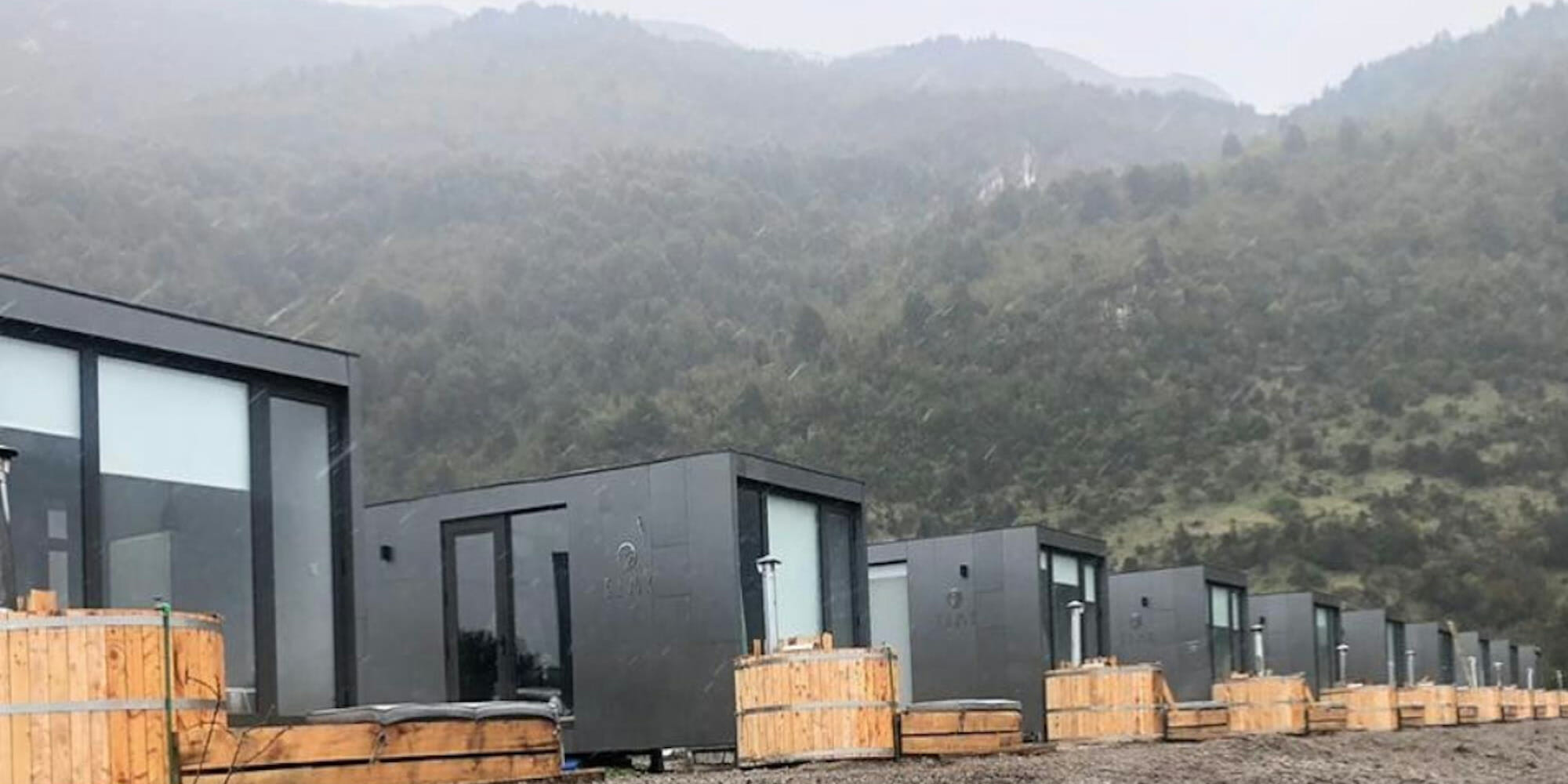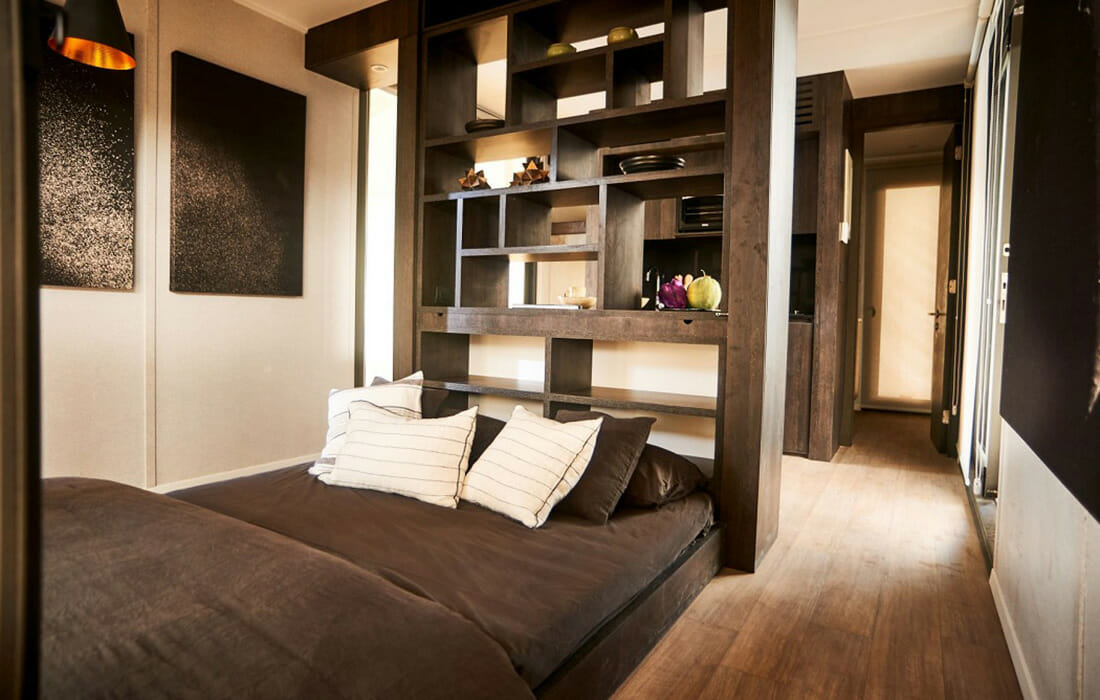Tiny Cabins Offer Minimalist Getaways

The concept of Tiny Homes is widespread in the United States, given its size and mobility advantages. This has generated a tendency to live with the essentials and at lower costs than maintaining large homes. The popularity of Tiny Homes isn’t confined to the United States, however.
MBI member Tecno Fast S.A. utilized this principle for the creation of their “Tiny Cabin by Tecno Fast” in Chile, South America. Technically the Tiny Cabin is a house with approximately 80 square meters of surface, with an efficient, minimalist, and high-quality design. Each cabin has a bedroom, kitchen, bathroom, closet, and additional services such as an electric lock and alarm.
The plans come in two modern designs from renowned Chilean architects Mathias Klotz and Felipe Assadi. Conceptually, the Tiny Cabin designed by Mathias Klotz is designed to share and enjoy with the family, with a living room that connects with a natural environment. Felipe Assadi’s creation is a space that prioritizes resting with a privileged view from the bedroom. The purpose is to create a minimalist and sustainable space.

The Tiny Cabins are prefabricated transportable steel structure modules and can be arranged adjacently to generate a single-family home. The modules have the following exterior measurements: width of 3.44 m; length of 6.94 m; height of 2.80 m, and dimensional tolerances of +/- 1cm.
The partitions and walls consist of plasterboard, glass wool and OSB. This ensures excellent acoustic measures, protection against fire and, above all, temperature, providing a module manufactured and designed for harsh weather conditions. The exterior cladding consists of a panel made of 2 aluminum sheets and a plastic core, giving it a modern and minimalist look. The roof is covered in liquid membrane, making it difficult to reach complicated and complex places such as the 2-channel canals, providing maximum impermeability. The windows, thermo panel with aluminum frames, provide a good seal to the outside while maintaining the indoor temperature, either cold or hot.
Tecno Fast launched this program in the Spring of 2019 by calling on those who have land in areas with high tourism potential. The methodology was based on registering on the company’s website www.tinycabin.cl, completing the application form and submitting a series of documents. Tecno Fast received over 1,000 applications from all over our country, from the most extreme zone to the most deserted area. The company selected the 50 best project locations and have installed Tiny Cabins throughout Chile including 10 located 1,897 km from the Tecno Fast factory, on the shore of General Carrera Lake in Chilean Patagonia.
This article was adapted from an Awards of Distinction entry. Browse more projects.
More from Modular Advantage
AoRa Development Aims for New York’s First Triple Net Zero Building Using Modular Methods
More cities are providing funding for newer infrastructure projects as long as they meet sustainability requirements. This is how modular can fit the bill, thanks to its lower waste production.
Developers and Designers: Lessons Learned with Modular Design
Modular construction is attractive to many developers because sitework and module construction can occur simultaneously, shortening the schedule and reducing additional costs.
UTILE: Putting Modular Building on a Fast Track
In Quebec, UTILE is taking the lead in creating affordable modular buildings to help decrease the student housing shortage. During the process, the company discovered what it takes to make the transition to modular building a success.
Sobha Modular Teaches Developers How to Think Like Manufacturers
With its 2.7 million square foot factory in UAE, Sobha Modular is bringing both its high-end bathroom pods to high-end residences to Dubai while developing modular projects for the U.S. and Australia.
RoadMasters: Why Early Transport Planning is Make-or-Break in Modular Construction
In modular construction, transportation is often called the “missing link.” While it rarely stops a project outright, poor planning can trigger costly delays, rerouting, and budget overruns.
Navigating Risk in Commercial Real Estate and Modular Construction: Insights from a 44-Year Industry Veteran
Modular projects involve manufacturing, transportation, and on-site assembly. Developers must understand exactly what they are responsible for versus what they subcontract. Risk advisors should research the developer’s contractors, subcontractors, and design-build consultants—especially the modular manufacturer.
Art²Park – A Creative Application of Modular and Conventional Construction
Art²Park is more than a park building—it’s a demonstration of what modular construction can achieve when thoughtfully integrated with traditional materials. The use of shipping containers provided not only speed and sustainability benefits but also a powerful structural core that simplified and strengthened the rest of the building.
Building Smarter: A New Standard in Modular Construction Efficiency
Rising material prices, labour shortages, expensive financing and tightening environmental rules have made conventional construction slower, costlier, and more unpredictable. To keep projects on schedule and within budget, builders are increasingly turning to smarter industrialized methods.
Resia: Breaking All the Rules
Resia Manufacturing, a division of U.S.-based Resia, is now offering prefabricated bathroom and kitchen components to industry partners. Its hybrid fabrication facility produces more precise bathroom and kitchen components (modules) faster and at lower cost than traditional construction. Here’s how Resia Manufacturing does it.
How LINQ Modular Innovates to Bring Modular To The Market in the UAE and Beyond
LINQ Modular, with an office and three manufacturing facilities in Dubai, is a modular firm based in United Arab Emirates. The company is on a mission: to break open the housing and construction markets in the Gulf Cooperation Council (GCC) area with modular.










